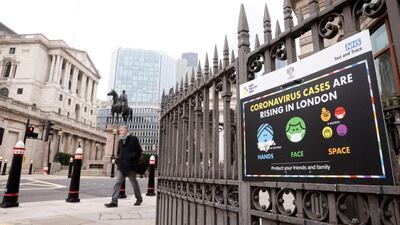London is the top global city for financial and professional services, according to a new study, despite the UK's trade deal with the EU failing to cover financial services.
The capital of the UK retained the number one position in a City of London Corporation benchmarking report when compared to other global financial centres such as New York, Singapore, Hong Kong and Frankfurt.
However, London’s financial district has a number of post-Brexit challenges to face, as an EU official warned on Friday that a deal for the financial services industry remains a distant prospect.
“The competitive strengths of London and the UK should mean that we are well placed to seize opportunities as we start a new trading chapter outside the European Union,” said Catherine McGuinness, policy chair at the City of London Corporation.
“In order to do so, however, we need to invest in infrastructure and skills across the country. We also need to ensure our regulatory framework keeps pace with technological change and innovation.”
The benchmarking report, Our global offer to business: London and the UK's competitive strengths in a changing world, which assesses 91 different metrics, found that while some major centres beat London in areas such as access to talent, Britain has the strongest overall competitive offering.
The study was published on the same day as Mairead McGuinness, European commissioner for financial services, said the EU does not have a fixed timeline for reaching a decision on financial services and emphasised that Brexit would inevitably hinder access to the bloc.
“Change is coming,” Ms McGuinness told Bloomberg TV. “There is no recreating the single market for financial services when they have decided to leave the single market.”
The realities of leaving the EU have “come home to roost” for Britain, Ms McGuinness said.
The financial industry was largely omitted in the EU trade deal enacted when Britain finally exited the EU on December 31, with London losing more than €6 billion ($7bn) in daily stock trades to EU venues on January 4, the first business day after the transition period.
Despite that, the City of London Corporation report found that London scored the highest in overall competitiveness with a ranking of 62, followed by New York at 54 and Singapore at 53.
London also performed strongly across all key dimensions, including innovation, reach of financial activity, resilience and business infrastructure, talent and skills, and regulation.
However, the report also identified areas to improve on, such as attracting more initial public offerings, as London sits behind the US in the total number of listed foreign companies and Hong Kong with its increasing number of foreign IPOs.
More focus should be made on boosting confidence that the UK is a market worth investing in, while London and the UK also have the slowest broadband speeds of all global financial centres.
Furthermore, only 20 per cent of financial services executive committee positions are held by women, with the UK lagging behind its global rivals.

Another challenge for the City of London is Britain’s battle with coronavirus, with England currently enduring its third national lockdown.
William Russell, the lord mayor of the City of London, told The National earlier this week that some major corporations are now considering a three-day week in the office after the pandemic, with the other two days spent working from home.
The financial district is currently “empty”, said Mr Russell, who hopes the 500,000-strong workforce will stop working from home once lockdown is lifted.
“Most corporations I’m talking to are looking at three days a week,” he said.


